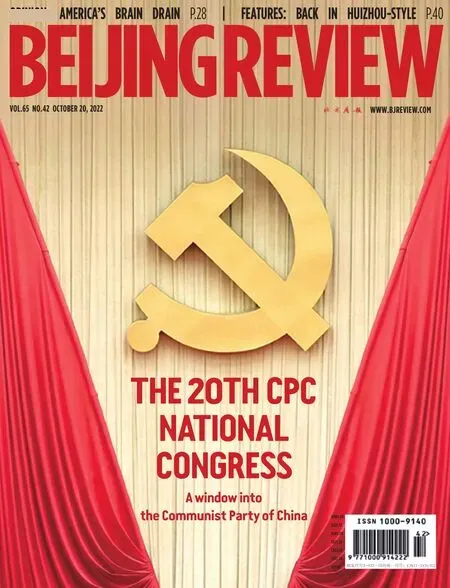Understanding China
The CPC and China in the eyes of a young American communist By Ma Miaomiao
‘To understand today’s China, we need to understand the Communist Party of China (CPC).”—That’s something Dylan Austin Walker, a 26-year-old American from Massachusetts, knows all too well.
Walker began learning Chinese when he met his closest childhood friend, an Americanborn Chinese, at the age of 5. In the friend’s home, Walker was attracted by books containing, the standard system for using the Latin alphabet to transliterate Chinese words, above the Chinese characters. The friend’s mother noticed his curiosity and began to teach him some basic Chinese characters.
He later attended a Chinese school in his hometown, and started to learn more about China,its history and language. “It was through learning Chinese that I began studying the history of China,but more importantly, learning about the CPC, the Chinese revolution and Mao Zedong Thought,”Walker said.
With his growing belief in communism, the day after his 18th birthday, Walker submitted an application to join the Communist Party of the United States of America (CPUSA).

Dylan Austin Walker (right) with a friend at Beijing Language and Culture University in January 2019
Walker became an international student at Beijing Language and Culture University in 2016, and acquired his bachelor’s and master’s degrees there. Being a CPUSA member living in China and a student majoring in international politics, he possesses a unique perspective from which to observe the development of the country and the CPC, as well as China’s relations with other countries.
The 20th National Congress of the CPC is an important event on China’s domestic political agenda. Walker expressed the hope that more people overseas can better understand China and the CPC through this congress, and gain an understanding of China’s whole-process people’s democracy.
According to him, people’s democracy works according to the logic of the socialist system, which examines all of society’s characteristics and focuses on the people’s needs. Within this institutional framework, wholeprocess people’s democracy protects the people’s basic rights and promotes the sustainable development of society. Developing whole-process people’s democracy and making sure that people are the masters of their country mean pursuing development centered on the interests of citizens as a whole and not those of any particular factions. “All this makes democracy perform at its best here in China and best meet people’s ever-growing aspirations for a better life,” he said.
One thing that impresses Walker deeply is how the CPC has never stopped drawing lessons from history and adapting to the changes in society. The Party is able to reform itself constantly and keep up with the times, which he thinks is an “institutional advantage” the CPC has.
He has visited many provinces and cities during his time in China, experiencing firsthand the rapid development of the country in all aspects. “The achievements China has made in recent decades are remarkable, because no other country has done what China has done in terms of developing the economy, especially during the last 40 years,” Walker said.
Walker believes that cultural and people-to-people exchanges are important to help foreigners better understand China. And he himself has taken every opportunity to tell people of his experiences in China.
“Some of my friends had a biased view toward China or on certain issues in the country, but I was telling them it’s not like that. You just have to put the political differences aside and try to understand the daily life,” Walker said while talking about the misunderstandings exist among the two peoples.
“We’re all the same basically. We are people, [and] we all want to have a good life, job, money, school, house, family… everything. Once you get to understand that, then when you come to China, you’ll be able to really see it,”he said. BR

